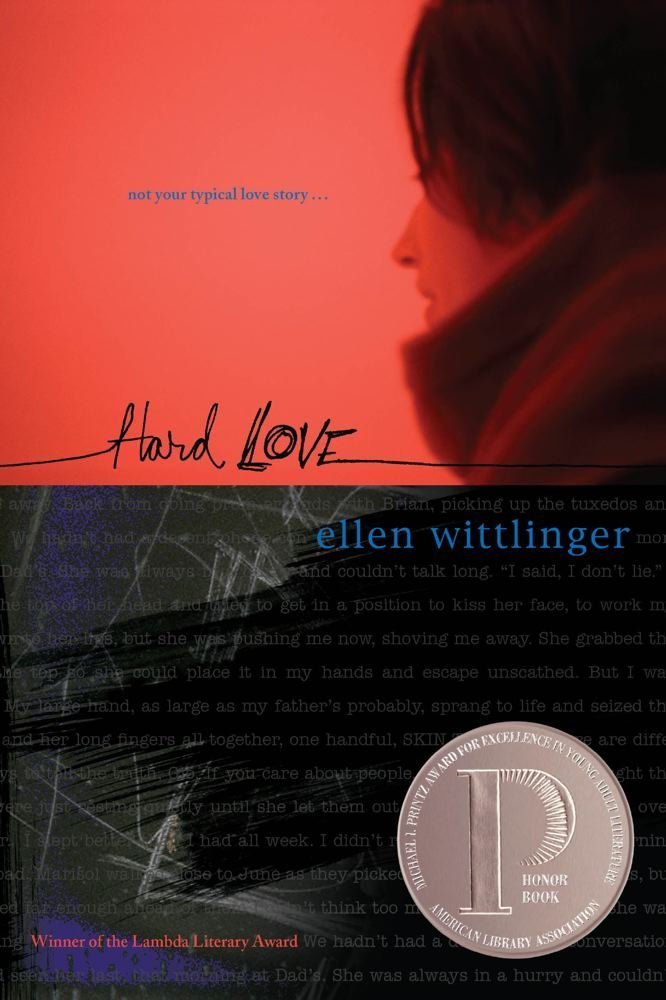I first read Hard Love in 8th grade, about ten years before I figured out I was a lesbian. Later, I decided my fascination with this novel should have been a clue that I was gay—the bashful curiosity that caused me to shut myself in my bedroom and tear through this book in just a few hours was probably a result of my literary crush on one of Ellen Wittlinger’s main characters, Marisol.
John (or Gio, as he dubs himself) is a bit of a loner, navigating his parents’ divorce through his newly founded zine, Bananafish. As Gio explores more of the indie zine culture, he discovers Marisol’s zine, Escape Velocity. Impressed with both her writing and her openness about her identity, Gio vows to seek out Marisol, hoping to gain some inspiration. Marisol agrees to teach him the ways of zine-making, and soon their relationship evolves into a true friendship, for which neither character is totally prepared.
I’ve always been fascinated by the ambiguous line between friendship and romance. This book takes that ambiguity and brings it into focus, as Gio and Marisol try to figure out how to be friends when there are some questionably more-than-friendly feelings involved.
Marisol is an amazing character. She is witty, sarcastic, super intelligent and incredibly confident. She knows more about herself than most adults do, and is constantly trying to understand her identity better. Her introspective side manifests itself in Escape Velocity, in which she validates her identity by naming it in a very Audre Lorde-like manner (“Marisol Guzman, Puerto Rican Cuban Yankee Cambridge, Massachusetts, rich spoiled lesbian private-school-gifted-and-talented writer virgin looking for love”).
But even Marisol doesn’t have it all figured out. As she advises Gio on his writing and his life, her attitude suggests that she sees the world in black and white—she honestly believes there is one right way to approach a situation. For this reason, she is caught off-guard when her friendship with Gio gets more complicated than expected.
I have much less patience for Gio than for Marisol. I always want him to grow more courageous as the story progresses, but when he decides to do something drastic, it is often without any consideration for the consequences. However, I do prefer Gio as a narrator: in Wittlinger’s companion book, Love and Lies: Marisol’s Story, I found that having insight into her point of view took away from her allure.
The primary flaw of Hard Love is its narrow-mindedness; it excludes any identity other than gay or straight. (For example, asexuality is deemed “a defect.”) Similarly, the novel relies on stereotypes of lesbians that made me a bit uncomfortable during my latest reading. I hate to think that the depictions of lesbians I saw in Hard Love defined what the term meant for me as a supposedly straight teenager.
At the same time, readers should remember that Hard Love was published in 1999, many years before the Malinda Lo and David Levithan age of LGBTQ YA. Only recently has the genre expanded to include such varied stories of queer youth. As such, Wittlinger was certainly a frontrunner in creating space for lesbian characters in mainstream YA literature—in fact, Hard Love won the Lambda Literary Award for YA fiction in 2000.
Though it is arguably less progressive than more recently published books, I still highly recommend Hard Love. Marisol and Gio’s struggle to define friendship will always be relevant, whether you are a teenager just trying to make it through high school or a twenty-something who wishes she had recognized the feelings this book conjured so many years ago.

